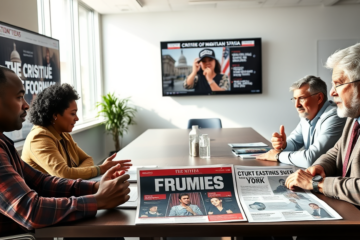Sustainable Transformations in Textile Retail
Sustainable Retail is becoming a priority in Brazil as consumers become increasingly aware of environmental issues.
This article explores the significant transformations that Brazilian textile retail is facing, especially in how brands adapt to this new demand.
Recent data shows that most consumers are willing to pay more for products that reflect a genuine commitment to social and environmental causes.
We will analyze circular economy practices, sustainable initiatives, and brands' commitment to integrating style and sustainability into their strategies.
Panorama of Sustainable Changes
Fashion consumption in Brazil has witnessed a significant transformation due to growing environmental awareness among consumers.
This change in behavior is directly reflected in the strategies adopted by Brazilian textile retailers.
Recent data indicates that 761% of consumers are willing to pay more for products that demonstrate a commitment to social and environmental causes..
This fact has served as a catalyst for companies in the sector to reevaluate their practices and integrate sustainability as one of the pillars of their operations.
Large retailers, as illustrated in the projects
EcoStyle
These initiatives not only help minimize environmental impact, but also directly respond to new consumer expectations that demand transparency and social and environmental responsibility from the brands they consume.
Brands' commitment to reducing greenhouse gas emissions and increasing the use of sustainable raw materials shows that sustainability is no longer a passing trend, but rather an important cultural shift..
As a result, there is a convergence between style and sustainability, which redefines the parameters of competitiveness in the market, and positions Brazil as a potential leader in the eco-fashion sector.
Strategic Transformations in the Brazilian Textile Sector
The adoption of sustainable practices is no longer optional and has become a strategic pillar for those operating in the national textile retail sector.
The following sections present, in detail, how the new consumer profile drives these changes, which circular economy initiatives are already yielding measurable results, and how brands are reconciling aesthetics and environmental responsibility.
Sustainable Consumer Profile
The behavior of Brazilian consumers who value sustainability in textile retail is changing.
Growing environmental awareness drives purchasing choices, with 76% of consumers willing to pay more for products that demonstrate socio-environmental responsibility.
This trend presents a new paradigm, where factors such as:
- Transparency in the origin of materials
- Responsible production practices
- Participation in recycling programs
- Importance of the environmental cause in campaigns
play a crucial role.
This consumer profile is not content with quality and price alone; they demand ethics and ecological commitment from brands.
Companies are forced to adopt sustainable practices; as the Study on sustainable fashion highlights, sustainability is now a necessity.
Initiatives such as the EcoEstilo project and the ReCiclo Movement transform fashion into an ecological practice, exemplifying how the sector adapts to a market demanding environmental changes.
This integration of style and sustainability reflects a non-passing evolution, but rather a permanent redefinition of value in the textile sector.
Actions that encompass these practices build a solid relationship between consumer and brand, increasing loyalty and stimulating a virtuous cycle of responsible consumption.
Circular Economy and Recycling Projects
Large retailers in Brazil are adopting practices of circular economy to promote a more sustainable future in the textile sector.
Projects such as Eco Style It is ReCycle Movement highlight significant advances in this context.
EcoEstilo, for example, has already collected more than 10 tons of clothes since 2011, while the ReCiclo Movement has collected more than 165 thousand items since 2012.
| Project | Result |
|---|---|
| Eco Style | 10 tons of clothes collected since 2011 |
| ReCycle Movement | 165 thousand pieces collected since 2012 |
These initiatives are clear examples of how the implementation of reverse logistics systems is reducing waste and extending the life cycle of parts.
This generates tangible benefits for the environment, in addition to strengthening the reputation of companies., attracting conscious consumers who value sustainable practices.
Furthermore, these actions foster new partnerships throughout the textile chain, demonstrating that sustainability has become an indispensable factor in business strategies.
By using recycled materials and implementing more efficient processes, retailers are paving the way for a more responsible textile future, where style and respect for the environment go hand in hand.
Integration between Sustainability and Style
The **harmonization between contemporary design and environmental responsibility** has become a crucial mission for Brazilian fashion brands, which seek not only to meet the demands of conscious consumers, but also to contribute to environmental preservation.
Companies are investing in innovative technologies and reevaluating their production processes to **reduce greenhouse gas emissions**.
A notable example is low-impact pigments and the use of recycled fibers, which not only minimize waste but also promote a reduced carbon footprint.
Initiatives such as the EcoEstilo project and the ReCiclo Movement reflect these companies’ commitment to sustainability.
They demonstrate that it is possible to combine aesthetics and responsibility, collecting thousands of used pieces to be reused or recycled into new creations.
Furthermore, adherence to ambitious emissions reduction targets, in line with international protocols, reinforces this commitment beyond marketing strategies.
Ultimately, this conscious action transforms sustainable fashion into a tangible and attractive reality, showing that sustainability is not an optional choice, but a vital element in brand strategies who want to stand out in today's competitive market.
In summary, Sustainable Retail is not just a passing trend, but a growing necessity in the strategies of companies in the Brazilian textile sector, reflecting the commitment to a more conscious and responsible future.



0 Comments